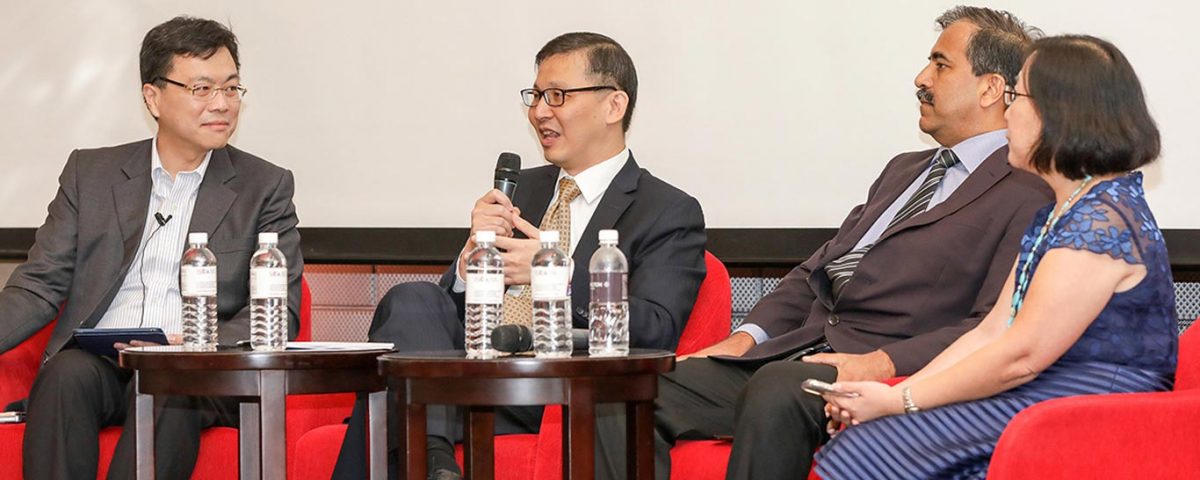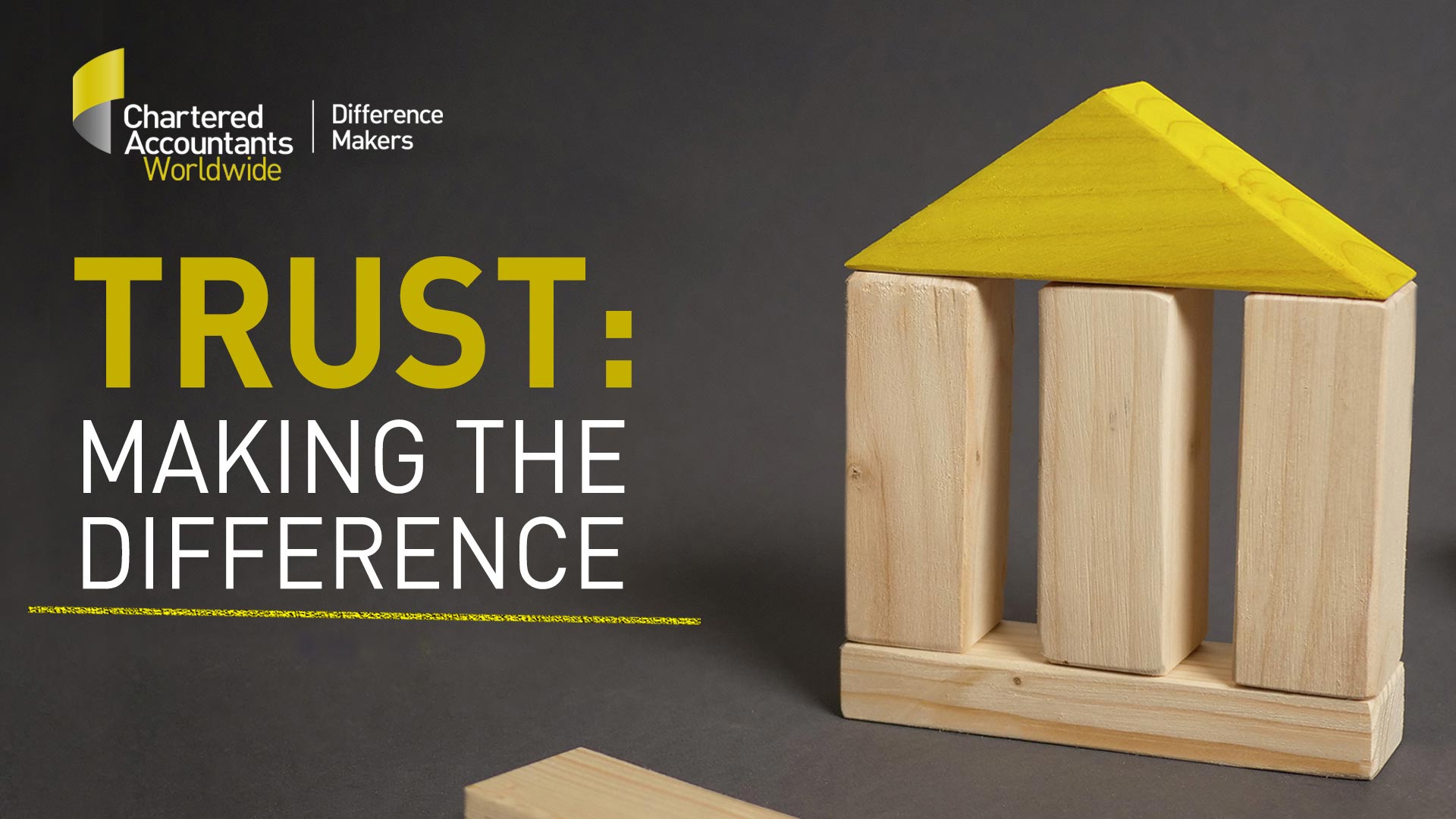The ISCA Ethics Committee (EC) organised the 2018 Ethics Seminar to highlight new developments in ethics and ethical standards. Taking place on April 13 at Carlton Hotel, the event saw a capacity crowd of over 200 members. On audit partner rotation, enhanced “fresh look” requirements will soon be introduced to strengthen the independence of auditors, both in mind and in appearance. The Seminar touched on what inducements are, and when an inducement might be considered corruption or bribery. Updates were also given on ethical standards developments at the International Ethics Standards Board for Accountants (IESBA).
Four speakers took to the stage to share their expertise. In this first of two articles, we provide the highlights of two presentations.

(From left) Kwok Wui San, immediate-past Chairman, ISCA Ethics Committee; Tan Seng Choon, Chairman, ISCA Ethics Committee; ISCA President Kon Yin Tong; Hamidul Haq, Partner, Rajah and Tann LLP, and Caroline Lee, Board Member, International Ethics Standards Board for Accountants
AUDIT PRACTICE BULLETIN (APB) NO. 2 OF 2017
During his presentation on APB No. 2 of 2017, Kwok Wui San, immediate-past Chairman1 of ISCA EC, noted that the APB provides guidance and sets out the Accounting and Corporate Regulatory Authority (ACRA)’s expectations of firms’ implementation of their internal policies, procedures and controls (IPPC) to address money laundering and terrorist financing risks. APB 2 was issued by ACRA in December 2017 and is currently effective.

Kwok Wui San, immediate-past Chairman, ISCA Ethics Committee
Mr Kwok highlighted that EP 200 requires professional accountants in public practice (PAIPPs) to have IPPCs, whether or not the PAIPPs provide professional services stipulated in paragraph 1.522 of EP 200. Therefore, a firm’s IPPCs must include all of the following:
a) Risk assessment and management (that is, a risk-based approach);
b) Group policy (if a group exists);
c) Customer due diligence (including enhanced customer due diligence);
d) Records keeping;
e) Reporting procedures;
f) On-going training;
g) Compliance management and appointment of compliance officer;
h) Hiring, and
i) Independent audit function.
EP 200 adopts a risk-based approach with regard to the implementation of IPPCs. For example, PAIPPs providing the services stipulated in paragraph 1.5 of EP 200 would need to comply with some specified requirements in EP 200 for their IPPCs, such as specified requirements on customer due diligence and record-keeping measures.
During the Q&A, a question was raised on whether the expectations in the APB 2 are higher than those in EP 200, especially for PAIPPs who do not provide services stipulated in paragraph 1.5 of EP 200. Mr Kwok pointed out that the APB 2 did clarify that a risk-based approach is intended. He explained that the APB 2 provides additional guidance, to be adopted on a risk-based basis, when firms implement IPPCs in compliance with EP 200.
Mr Kwok further noted that ACRA takes a serious view of non-compliance with the requirements in EP 200. Disciplinary actions, such as warning letters, financial penalties or even suspension/termination of licences, could be taken in cases of non-compliance.
EP 200 can be accessed here.
PROPOSED CHANGES TO EP 100 ON LONG ASSOCIATION PROVISIONS
In March 2018, ISCA issued the Exposure Draft (ED) on the revised Long Association Provisions. The revised Long Association Provisions would be adopted into the EP 100: Code of Professional Conduct and Ethics in due course. The expectation is for the new requirements to be effective for financial periods commencing 15 December 2018, allowing PAIPPs six months to undertake the appropriate remedial actions, such as compliance with new “cooling-off” requirements. The revisions would ensure that the Long Association Provisions continue to provide robust and appropriate safeguards to deal with familiarity and self-interest threats created when a firm uses the same senior personnel on an audit or assurance engagement over a long period of time.
Tan Seng Choon, Chairman1 of the ISCA EC, provided participants with an in-depth diagnosis on the revised Long Association Provisions. Here are some salient snippets from his presentation.

Tan Seng Choon, Chairman Ethics Committee
What is the issue? Why the need for change?
It is in the public interest that members of audit and assurance teams and firms be independent, both in mind and in appearance, of their audit and assurance clients. Long association of personnel on an audit or assurance engagement client can adversely impact objectivity and professional scepticism, which are important contributors to audit quality.
Using the same personnel on an audit or assurance engagement over a long period of time may create familiarity and self-interest threats that may impact, or be seen to impact, an individual’s independence. ISCA recognises that independence, objectivity and professional scepticism are critical to stakeholder confidence in the audit profession. Concerns have been raised on the robustness of the existing Long Association Provisions to address threats to independence, particularly in relation to the audit of a client that is a Public Interest Entity (PIE).
What are the key changes?
The General Provisions requirements have been expanded and strengthened. The expanded General Provisions require a more robust evaluation of the significance of the familiarity and self-interest threats, and stipulates in more detail the factors required to be considered, which include the overall length of the individual’s relationship with the client. The General Provisions have also been expanded to state that if the threats are so significant that rotation of an individual is a necessary safeguard, the firm shall determine the appropriate period for the individual to be “away” from the audit engagement such that the familiarity and self-interest threats to independence are eliminated or reduced to an acceptable level.
For audits of PIEs, the cooling-off period will be increased from two years to five years for the Engagement Partner (EP), and from two years to three years for the Engagement Quality Control Reviewer (EQCR). However, the time-on period for an EP of a company listed on the Singapore Exchange (SGX) would likely be increased from five years under existing SGX Listing Rules to seven years. Please see the illustration (in this article) on how the revised Long Association provisions are applied for listed entities for further details.
Additional restrictions are also placed on former Key Audit Partners (KAPs) during the cooling-off period. They are prohibited from leading or coordinating the firm’s professional services to the audit client or overseeing the firm’s relationship with the audit client. Former KAPs are also prohibited, during the cooling-off period, from undertaking any other role, including provision of non-assurance services, that would result in significant or frequent interaction with senior management or those charged with governance. Mr Tan cautioned that “significant or frequent interaction” requires the application of professional judgement.
A question was raised as to whether the former EP could attend meals with the former audit client together with the current EP during the cooling-off period. According to Mr Tan, much would depend on how significant or frequent those meals are. If the meals are frequent (example, monthly), the former EP would likely be perceived to be in breach of the new cooling-off requirements. It could be less of an issue if it were a once-off “handover meal” whereby the former EP sat in to brief the current EP on matters such as client expectations. Mr Tan further shared that in such cases, the former EP should document the matters discussed at the lunch as part of the risk management process.
For an SMP with no Listed Client, do the Long Association Provisions still matter?
The Long Association Provisions affect PIEs. The definition of PIE is wider than listed company. Paragraph 290.25 of EP 100 defines PIE as all listed entities and any entity:
(i) defined as PIE by law or regulation, or
(ii) for which the audit is required to be conducted in compliance with the same independence requirements that apply to the audit of listed entities. Such regulation may be promulgated by any relevant regulator, including an audit regulator.
Mr Tan shared that the scope of PIEs in Singapore covers a wide range of entities. Beyond entities listed on the SGX, large charities and institutions of public character (IPCs) and financial institutions are also defined as PIEs.
Also, there are certain situations whereby the auditor of a non-PIE audit client in Singapore is required to comply with the Long Association provisions. An example is when his audit firm is part of a global network which requires its members to comply with the requirements in the IESBA Code or when the group engagement team instructs component auditors (such as the Singapore auditor) to comply with the IESBA requirements.
Mr Tan further shared that ISCA has issued, in February 2018, EP 100 Implementation Guidance 2 (EP 100 IG 2): Frequently Asked Questions on Key Audit Partners, to provide clarification on the definition, identification and determination of KAPs.
EP 100 IG 2 can accessed here.
Illustration on how the revised Long Association Provisions are applied for listed entities
Mr Tan shared three scenarios on how the revised Long Association provisions would result in a change in the cooling-off periods for the EPs of listed entities in Singapore (if there are no transitional provisions3).
Due to current SGX listing requirements, EPs of listed audit clients have a time-on period of five years instead of the seven years as required under EP 100. ISCA is currently in the process of reaching out to SGX to align the SGX listing requirements with the revised Long Association provisions in EP 100.
The scenarios below do not take into account transitional provisions (if any) and assume that the new SGX listing requirements are aligned to the revised Long Association provisions in EP 100 and are effective for financial period commencing 15 December 2018. The listed entity illustrated below has a 31 December financial year (FY) end

Figure 1: Time-on and cooling-off periods for EPs of listed entities: Three scenarios
In the first scenario, the EP started his cooling-off in the FY beginning 1 January 2017 after serving as EP for five years. As he has cooled-off for the two years as required under the current Long Association provisions when the revised Long Association provisions take effect in the FY beginning 1 January 2019, he would be able to serve as EP for the full seven years from the FY beginning 1 January 2019 to the FY beginning 1 January 2025.
In the second scenario, the EP started his cooling-off in the FY beginning 1 January 2018 after serving as EP for five years. He has cooled-off for one out of the two years as required under the current Long Association provisions when the revised Long Association provisions take effect in the FY beginning 1 January 2019. Once the revised Long Association provisions take effect, he would need to cool-off for four more years instead of one more year. Thus, he can only return as EP for the full seven years from the FY beginning 1 January 2023 and serve to the end of the FY beginning 1 January 2029.
In the third scenario, the EP has served as EP for five years as at 31 December 2018. As the new SGX listing requirements mandating a time-on period of seven years is effective from 1 January 2019, the EP could remain as EP for two more years, such that the five-year cooling-off begins on 1 January 2021. Alternatively, he could commence the five-year cooling-off from 1 January 2019.
IN CONCLUSION
Summing up the Ethics Seminar, Mr Kwok had the following message for the participants, “Ethics is fundamental to the accountancy profession. Without it, people will lose trust in what we do. We play a unique role. We are relevant because some things are required to be done by a trusted professional, such as independent audits. If people no longer trust us, we will eventually lose our relevance. It won’t matter then that the work we produce is of the highest quality.”

(From left) Kwok Wui San, immediate-past Chairman, ISCA Ethics Committee; Tan Seng Choon, Chairman, ISCA Ethics Committee; Hamidul Haq, Partner, Rajah and Tann LLP, and Caroline Lee, Board Member, International Ethics Standards Board for Accountants
The participants gained interesting and useful insights from presentations by Hamidul Haq, Partner, Rajah and Tann LLP, and Caroline Lee, Board Member, IESBA. The Ethics Seminar concluded with a Q&A session, with all four speakers addressing questions from the floor.
In the second article, we will provide highlights from the presentations by Mr Haq and Ms Lee on corruption and inducement, the Restructured Code, revised safeguards provisions and enhanced conceptual framework. Do stay tuned.
Lim Ju May is Deputy Director, and Ang Soon Lii is Manager, Corporate Reporting & Ethics, ISCA.
1 Kwok Wui San served as Chairman of the ISCA EC from July 2014 to April 2018; Tan Seng Choon succeeded him as Chairman from April 2018.
2 Paragraph 1.5 of EP 200 states:
When professional accountants in public practice and professional firms which prepare for or carry out transactions for their clients concerning the following situations, there are specific measures on customer due diligence and records keeping under the FATF Recommendations which they have to follow, which are set out in Section 4:
- a) Buying and selling of real estate;
- b) Managing of client money, securities or other assets;
- c) Management of bank, savings or securities accounts;
- d) Organisation of contributions for the creation, operation or management of companies;
- e) Creation, operation or management of legal persons or arrangements, and buying and selling of business entities.
3 IESBA’s final revised Long Association provisions includes a transitional provision which is effective for audits of financial statements for periods beginning prior to 15 December 2023. In instances where a legislative body or regulator (or organisation authorised or recognised by such legislative body or regulator) has established a cooling-off period for an engagement partner of less than five consecutive years, the higher of that period or three years may be substituted for the cooling-off period of five consecutive years specified in paragraphs 290.155, 290.158 and 290.160(a) of the Long Association ED, provided that the applicable time-on period does not exceed seven years.
This article was first published in ISCA Journal.













